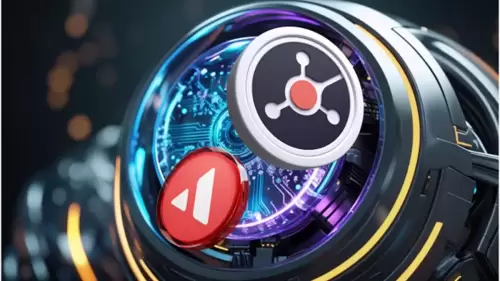 |
|
 |
|
 |
|
 |
|
 |
|
 |
|
 |
|
 |
|
 |
|
 |
|
 |
|
 |
|
 |
|
 |
|
 |
|
Cryptocurrency News Articles
Akash Network, NVIDIA Blackwell, and Decentralized AI: A New Era?
Aug 06, 2025 at 05:39 am
Akash Network gears up for NVIDIA Blackwell integration, boosting decentralized AI. Pi Network's $20M AI investment signals a shift in blockchain's real-world applications.

Akash Network, NVIDIA Blackwell, and Decentralized AI: A New Era?
The intersection of decentralized cloud computing, cutting-edge AI hardware, and blockchain technology is heating up. Akash Network's move to integrate NVIDIA's Blackwell GPUs, coupled with Pi Network's $20 million investment in decentralized AI, signals a significant shift. Let's dive into what this means for the future.
Akash Network and NVIDIA Blackwell: Powering On-Chain AI
Akash Network is leveling up its decentralized Supercloud infrastructure with NVIDIA's Blackwell-based B200 and B300 GPUs. This upgrade is all about boosting performance for AI training and inference workloads directly on the blockchain. Think of it as giving AI developers the horsepower they need without relying on traditional, centralized cloud providers. They're not just stopping at Blackwell; Akash already supports a range of GPUs, including H100, A100, A6000, RTX 4090, and RTX 8000. It's like building a diverse AI super-playground, open to everyone.
Akash Network's global marketplace is democratizing access to GPU resources for AI developers and researchers worldwide. This ensures fair access, no matter where you are located. The network's Proof-of-Stake consensus mechanism is also more energy-efficient compared to Proof-of-Work systems. It is making cloud services more accessible by distributing cloud hosting resources among network participants, letting them rent out unused computing resources.
Pi Network's AI Play: Decentralized Robotics with OpenMind
Pi Network is making waves beyond its blockchain roots. Their $20 million investment in OpenMind, a Silicon Valley startup focused on decentralized AI and robotics, is a bold move. OpenMind is developing OM1, a universal operating system for robots, and the FABRIC protocol, which focuses on machine identity and real-time coordination. This is about building a decentralized robotics ecosystem for everything from self-driving cars to smart factories.
This investment, joined by big names like Coinbase Ventures and Pantera Capital, shows that Pi Network is serious about long-term strategic growth. Even with its native token at an all-time low, Pi is betting that decentralized AI and robotics will be the next big thing, bridging the gap between blockchain and the physical world.
AKT Token and Market Predictions
The Akash Network's native token, AKT, is currently trading around $1.44. Analysts are throwing around some pretty optimistic long-term price forecasts, with some projecting highs of $6.19 by 2025 and even $30.16 by 2030. These predictions reflect the growing demand for affordable computing solutions, driven by AI and Web3 applications.
Of course, these are just predictions. Regulatory pressures, market volatility, and technological advancements could all throw a wrench in the works. But the AKT token's role in governance, staking, and cloud service settlements positions it well to benefit from the growth of decentralized computing.
My Two Sats: The Future is Decentralized and Intelligent
Personally, I think these developments are incredibly exciting. The combination of Akash Network's decentralized cloud infrastructure, NVIDIA's powerful GPUs, and Pi Network's foray into decentralized AI and robotics paints a picture of a future where AI is more accessible, more democratic, and more integrated into our daily lives. Will it all pan out exactly as predicted? Probably not. But the trend is clear: decentralized AI is here to stay, and it's going to be a wild ride.
So, buckle up, folks! The future of AI is decentralized, and it's looking brighter (and more computationally powerful) every day. Who knows, maybe one day your self-driving car will be powered by an Akash Network node running on an NVIDIA Blackwell GPU. The possibilities are endless!
Disclaimer:info@kdj.com
The information provided is not trading advice. kdj.com does not assume any responsibility for any investments made based on the information provided in this article. Cryptocurrencies are highly volatile and it is highly recommended that you invest with caution after thorough research!
If you believe that the content used on this website infringes your copyright, please contact us immediately (info@kdj.com) and we will delete it promptly.





























































